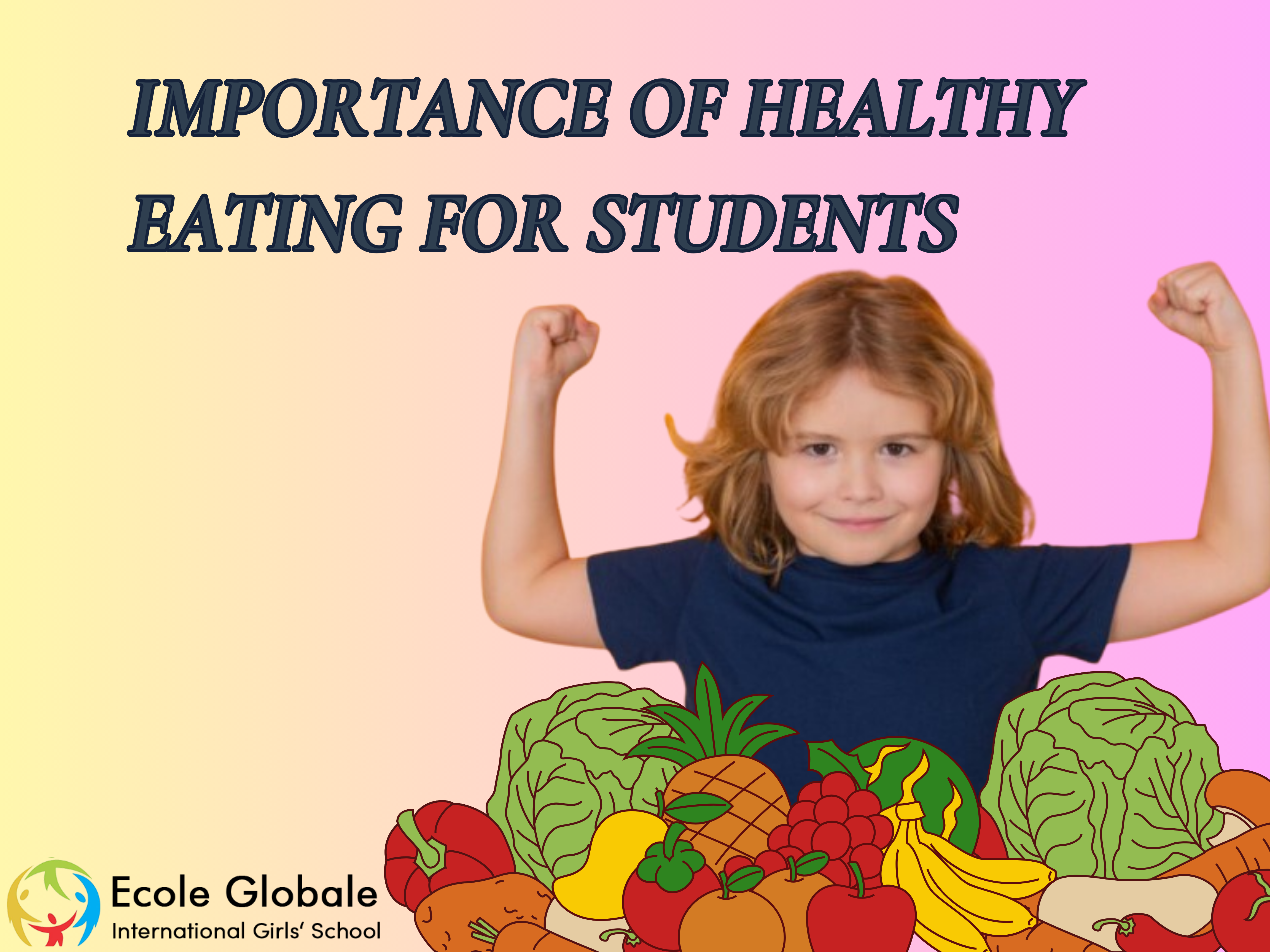Importance of Healthy Eating for Students is more than just filling your stomach; it’s about fueling your body and mind to perform at their best. For students, eating the right foods can make a huge difference in school performance, mood, and overall well-being.
A balanced diet provides the nutrients that boost brain function, support physical health, and set the foundation for lifelong healthy eating habits. Let’s explore how eating well helps students succeed in school and life.
1. Eating Well Helps You Learn and Focus Better

Healthy foods directly impact how your brain works, making it easier to focus, learn, and remember information.
-
Makes Your Brain Stronger:
Foods rich in omega-3 fatty acids, such as fish and walnuts, help build brain cells and improve communication between neurons. Leafy greens like spinach and kale are packed with antioxidants that protect the brain from damage.
-
Improves Memory and Focus:
Berries, nuts, and whole grains are known as “brain foods” because they enhance memory and concentration. Eating these foods can help students pay attention in class and retain information better.
-
Better Grades:
A diet filled with nutritious foods can positively affect school performance. Studies show that students who eat a balanced breakfast often score higher on tests and have longer attention spans than those who skip meals.
2. Keeps Your Body Strong and Healthy

Eating a variety of nutritious foods is essential for students’ growth and development, helping them stay strong, active, and ready to learn.
-
Nutrients You Need:
Calcium, found in dairy products, helps build strong bones, while protein from meats, beans, and eggs supports muscle growth. Iron, found in leafy greens and lean meats, boosts energy levels and keeps you alert.
-
Maintains Healthy Weight:
A balanced diet helps students maintain a healthy body weight, which is crucial for avoiding obesity-related health issues. Choosing fruits, vegetables, and whole grains over processed snacks helps control weight and promotes overall well-being.
-
Fights Off Sickness:
Foods rich in vitamins and minerals, like citrus fruits and colorful vegetables, strengthen the immune system. A strong immune system helps students stay healthy, reducing the number of sick days and allowing them to attend school regularly.
3. Boosts Your Mood and Energy

What you eat can affect how you feel and how much energy you have throughout the day.
-
Keeps Your Mood Steady:
Regular, balanced meals with the right nutrients can help manage stress, reduce anxiety, and keep mood swings at bay. Complex carbohydrates like oats and whole wheat provide steady energy without the crash that comes from sugary snacks.
-
Gives You Lasting Energy:
Lean proteins, complex carbohydrates, and healthy fats provide sustained energy, keeping students active and engaged throughout the school day. Avoiding high-sugar snacks helps prevent energy dips that can lead to fatigue and irritability.
-
Helps You Get Along with Friends:
Feeling good on the inside reflects on the outside. Healthy eating can improve mood, which positively impacts social interactions and helps students build better relationships with peers.
4. Builds Healthy Habits for Life

The eating habits you develop as a student can stick with you for life, setting the stage for long-term health and happiness.
-
Start Good Habits Early:
Learning to eat well as a student can make healthy eating a natural part of your lifestyle as you grow older. It’s easier to stick to good habits when you start them early.
-
Prevents Health Problems:
A nutritious diet reduces the risk of developing chronic diseases like diabetes, heart disease, and obesity. Students who eat healthily are more likely to carry these habits into adulthood, leading to a healthier future.
-
Encourages Active Living:
Healthy eating goes hand in hand with an active lifestyle. Eating the right foods gives you the energy needed to participate in sports, play with friends, and stay physically active, all of which contribute to overall well-being.
Easy Tips to Eat Healthy Every Day

Eating healthy doesn’t have to be hard or boring. Here are some simple tips to make healthier food choices.
- Plan Your Meals: Planning meals and snacks ahead of time helps ensure you’re eating balanced meals. Packing a healthy lunch or snacks like fruits, nuts, and yogurt can prevent the temptation to grab unhealthy options.
- Healthy Swaps: Replace chips with veggie sticks, sugary drinks with water or milk, and candy with fresh fruit. Small swaps can make a big difference in how you feel.
- Eat a Variety: Try to include different colors on your plate, like red tomatoes, green spinach, and orange carrots. Eating a variety of foods ensures you’re getting all the nutrients your body needs to grow and thrive.
How Parents and Schools Can Help You Eat Better

Support from both parents and schools plays a crucial role in helping students make healthy eating choices.
- Healthy School Lunches: Schools can offer nutritious meals that meet students’ dietary needs. Balanced school lunches with fruits, vegetables, whole grains, and lean proteins help students stay focused and energized throughout the day.
- Support from Parents: Parents can help by preparing healthy meals at home, packing nutritious snacks, and setting a good example by choosing healthy foods themselves.
- Learning About Nutrition: Schools can teach students about nutrition and the benefits of healthy eating. Learning about what foods are good for your body can empower students to make better food choices on their own.
Conclusion: Make Healthy Eating Your Priority
Healthy eating isn’t just about food; it’s about setting yourself up for success in school and beyond. By choosing the right foods, you can improve your focus, boost your energy, and stay strong and healthy.
Even small changes in your diet can lead to big improvements in how you feel and perform in school. So, start making healthier choices today to support your academic and personal success!









